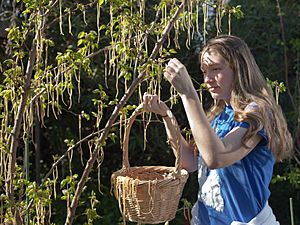April Fools' Day facts for kids
Quick facts for kids April Fools' Day |
|
|---|---|

An "April Fools' Day" hoax marking the construction of the Copenhagen Metro in 2001
|
|
| Also called | All Fools' Day |
| Type | Cultural, Western |
| Significance | Practical pranks |
| Observances | Humour |
| Date | April 1 |
April Fools' Day (also called April Fool's Day) is a fun day celebrated in many countries around the world on April 1 each year. On this day, people play harmless practical jokes and tricks on their friends and family. These jokes are meant to surprise or make others laugh. In some places, the jokes are only supposed to happen before noon. If someone plays a trick after noon, they might be called an 'April Fool' themselves!
Contents
The Start of April Fools' Day
People have enjoyed playing jokes and tricks for hundreds of years. The ancient Romans had a special holiday called Hilaria. During this time, people would dress up in costumes and play tricks.
In the Middle Ages, many towns in Europe celebrated New Year's Day on March 25. In some parts of France, New Year's was a week-long party that ended on April 1. Some people think April Fools' Day started because those who celebrated New Year's on January 1 made fun of those who celebrated on other dates.
Fun Customs Around the World
April Fools' in the United Kingdom
In the U.K., if you played a joke, you would shout "April Fool!" at the person you tricked. Traditionally, all jokes were supposed to stop by midday. If you played a joke after noon, you were considered the April Fool.
In Scotland, April Fools' Day was once known as "Huntigowk Day." This name comes from "hunt the gowk." A gowk is a Scottish word for a cuckoo bird or a silly person. A common prank was to send someone on a fake errand. They would carry a sealed message that asked for help. But the message actually said: "Dinna laugh, dinna smile. Hunt the gowk another mile." The person receiving the message would then send the victim to someone else with the same message, and so on!
April Fools' in Nordic Countries
In countries like Sweden, Norway, and Denmark, many news channels and newspapers would publish or broadcast a fake news story on April 1. These stories were often so believable that many people fell for them!
April Fish Day in Europe
In Italy, France, Belgium, and French-speaking parts of Switzerland and Canada, April 1 is often called "April fish." In French, it's poisson d'avril, and in Italian, it's pesce d'aprile. A popular prank is to try and stick a paper fish onto someone's back without them noticing. If you succeed, you might shout "April fish!" Many old postcards from the late 1800s and early 1900s show this fish prank. Newspapers also sometimes print a false story on this day, and they might even include a small hint about a fish to show it's a prank.
April Fools' in Spanish-Speaking Countries
Many Spanish-speaking countries, including the Philippines, have a holiday similar to April Fools' Day. It's called "Día de los Santos Inocentes" (Holy Innocents Day). This day is celebrated in late December, usually on the 27th, 28th, or 29th, depending on the location. Just like April Fools' Day, it's a day for playing jokes and tricks.
Media Pranks on April Fools' Day
Sometimes, big news companies will broadcast or publish a fake news story on April 1. One famous example happened in 1957. The BBC (a British news company) showed a story about spaghetti trees. The story claimed that people in Switzerland grew spaghetti on trees! After the broadcast, many people called the BBC asking how they could get their own spaghetti tree. This shows how convincing April Fools' pranks can be!
Images for kids
-
An 1857 ticket to "Washing the Lions" at the Tower of London. This event never actually happened.
-
On April Fools' Day 1980, the BBC announced Big Ben's clock face was going digital. They even offered to give away the old clock hands!
-
An April Fools' Day prank in Boston Public Garden warning people not to photograph sculptures. It claimed light would "erode the sculptures."
See also
 In Spanish: Día de las bromas de abril para niños
In Spanish: Día de las bromas de abril para niños
 | James Van Der Zee |
 | Alma Thomas |
 | Ellis Wilson |
 | Margaret Taylor-Burroughs |





